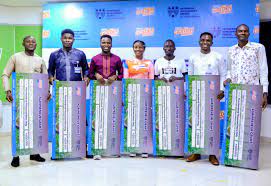Nestle Enhancing Farmers’ Capacity, Encouraging More Participation in Agriculture

By EDET UDOH
In order to ensure a sustainable food system in Nigeria that will provide food for a projected 9.7 billion people by 2050, Nestle Nigeria has continued to introduce various initiatives that will enhance the capacity of the farmers, increase their yields as well as encourage more participation in agriculture.
In a bid to ensure actualization of this, the Good Food, Good Life Company, has initiated various project and initiatives including the Inclusive Grain Value Chains project which was launched in Kaduna, Nigeria on March 30, 2021; Golden Morn Agripreneurship Webinar Series, inaugurated in October 2021, as well as its collaboration with International Fertilizer Development Centre (IFDC)/2 Scale to ensure provision of adequate fertilizer to the farmers.
These initiatives are aimed at eliminating post-harvest losses, ensure improved quality and quantity of farm produce and enhance farmers’ profitability to encourage more people to engage in farming activities.
Nestlé Nigeria in partnership with IDH the Sustainable Trade Initiative, and TechnoServe launched the Inclusive Grain Value Chains project with the aim of helping 5,000 smallholder farmers earn better livelihoods by supplying high-quality maize, soybeans, millet, and sorghum to Nestlé.
On the other hand, Golden Morn Agripreneurship Webinar Series is Nestle commitment to improving youth participation in agriculture through training and support for agriprenuers.
Nestlé Nigeria’s collaboration with International Fertilizer Development Centre (IFDC) / 2Scale, is aimed at improving farmers’ livelihoods by empowering smallholder farmers on sustainable farming practices.
Inclusive Grain Value Chains Project
The seven-month project, apart from ensuring more inclusive and transparent sourcing of maize, soybeans, millet, and sorghum for Nestlé’s operations in Nigeria, also incorporated smallholders into a value chain which was not only to benefit the farmers for increased incomes from selling into stable and formal markets—but also the company, which will benefit from a steady supply of locally grown crops.
Over the last few years, Nestlé has worked with smallholder farmers and aggregators in Kaduna State, Nigeria to improve crop quality, significantly reducing rejection rates from over 30% to 4%.
As a result of abnormal rainfall patterns caused by climate change which made it difficult for farmers to properly dry their grain, and was difficult to build upon and maintain the crop quality. Therefore, the company believes that in developing inclusive grain value chains, it will address some of the challenges faced by stakeholders across the supply chain.
The project was designed to work with six small- and medium-sized enterprises (SMEs) that aggregate crops and supply them to Nestlé factories.
Indeed, the initiative was aimed at building the capacity of businesses all along the grain value chain: aggregators and sub-aggregators through training on proper grain handling, storage, and testing, as well as entrepreneurial and financial skills, while logistics partners were trained on proper handling and storage of grain during transit.
The initiative also worked with extension agents from the aggregators who provided agronomy training to farmers, with a focus on good agricultural practices and post-harvest handling.
The project was aimed at also ensuring increased traceability by working with aggregators to improve recordkeeping and by using assay testing kits to track the quality of grains provided by individual farmers in order to enable the initiative and stakeholders to better tailor training to the specific needs of smallholders.
Aimed at also addressing the challenges posed by climate change, the project worked with the aggregators to ensure the provision of accurate weather forecasts to farmers, helping them to make better decisions about when to dry their grains.
Other objective behind the initiative was that of engaging stakeholders to pilot new, low-cost technological innovations like solar dryers for enhanced production and increased profitability.
The Developing Inclusive Grain Value Chains project was expected to improve the incomes of 5,000 smallholder farmers and increase the sales of the six aggregator SMEs by at least 10%.
Commenting on the project, Nestlé Nigeria Managing Director and CEO, Wassim Elhusseini, stated that the Company was committed to building strong communities and supply chains, improving livelihoods in communities directly connected to its business activities.
He said the Company was delighted to work with IDH and TechnoServe to improve the livelihoods of smallholder farmers and SMEs who work within its supply chain, adding that “This project will help 5,000 families apply more sustainable farming practices to improve their household income while protecting the environment for the generations to come.”
IDH Nigeria Country Director, Cyril Ugwu added, “We are excited at this opportunity of working with TechnoServe and Nestlé in our joint mission to contribute to the improvement of agribusiness entrepreneurship in Nigeria. The partnership is crucial as it’s not only contributes to improved local sourcing of commodities by a reputable brand as Nestlé, it also contributes to food security and the economic well-being of a teeming number of farmers in the region.”
“Building more inclusive supply chains is a win-win for farmers and the private sector,” said Ayokanmi Ayuba, TechnoServe’s Deputy Country Director and Director of Programs in Nigeria. “We are excited to work with Nestlé and IDH on this initiative to create lasting impact for smallholders, small businesses, and the sector as a whole.”

Golden Morn Agripreneurship Webinar Series
Golden Morn Agripreneurship Webinar Series is Nestle’s commitment to improving youth participation in agriculture through training of local farmers and support to young entrepreneurs in the agricultural sector.
Golden Morn Agripreneurship Webinar Series inaugurated in October 2021 was focussed on building the capacity of next-generation farmers and reduce youth unemployment rate in Nigeria.
The two-day virtual training always touched on different aspects of the agriculture value chain including sales and marketing.
Outcome of the business training and coaching they have received led to farmers becoming much more confident about their position and the quality of their products. For women producers, this has had an especially strong impact.
For example, Mrs. Hanna Musa, one of the two women in the negotiations team, prior to the coaching, had been too shy to speak up, but the opportunity to participate in the negotiations on Nestlé’s terms of delivery and payment, helped her grow into her leadership role.
Speaking on the drivers of the outcome of Nestlé Nigeria & IFDC/2Scale Project Sorghum & Millet, Mr. Maxwell Olitsa, Project Manager, IFDC said, “We achieved the results in the field by empowering farmers to adopt best practices and new technology. Showing in addition to telling also made a lot of difference. 27 demo plots were established; six of them managed by women, where best farming practices are demonstrated. The demo plots are always accessible to the farming clusters to provide continuous technical support and coaching in the field.”
To ensure crop integrity from farm to factory gate, the project also trains aggregators, pesticide spray providers and input suppliers. This 360-degree approach has significantly reduced post-harvest losses.
While helping to improve the livelihoods of farmers within the project, Nestlé projects which remain the continued intervention with its partners will result in sustainable supplies of high quality grains required for its production sites.
Emphasizing on the impact of the project on the livelihoods of farmers and on the company, Managing Director/CEO, Nestlé Nigeria, Mr. Wassim Elhusseini said, “Today, we source about 80% of our agricultural raw material in the country. As we work towards increasing this percentage, we remain committed to working alongside our partners to further improve the quality and quantity of grains and legumes”.
“The results we have achieved so far with Nestlé Nigeria & IFDC/2Scale Project Sorghum & Millet is an example of what is possible when we look at the agriculture value chain holistically from the farm to storage, to transportation, and right down to the factory gate and take definite measures to close the gaps,” he stated.
Nestle Nigeria Collaboration with IFDC
Nestlé Nigeria PLC, in collaboration with International Fertilizer Development Centre (IFDC) / 2Scale, is helping farmers improve their livelihoods by empowering smallholder farmers on sustainable farming practices under the initiative, Nestlé Nigeria & IFDC/2Scale Project Sorghum & Millet. The partnership aims at improving grain quality and productivity.
In the past few years, Nestlé, together with its implementing partners, has made significant impact in the nation’s agriculture value chain, training over 7905 sorghum and 1069 millet farmers on good agricultural pre-harvest and post-harvest practices.
Out of this number, 22% of these farmers are women. The farmers testify to a significant increase in income. This change is due to an increase in productivity, improved crop quality and the availability of a ready market, which eliminates the negative influence of middlemen.
Before Nestlé Nigeria & IFDC/2Scale Project Sorghum & Millet’s intervention, the yield per hectare was 0.9 tons. In the first year of the project in 2015, the yield doubled to 1.3 tons/hectare, and reached 1.8 tons/hectare in 2017. The target was to reach 2.20 tons/hectare in 2018 farming season, progressing towards the maximum yield capacity of 2.35 tons/hectare of the crop varieties. Efforts made to get the update on the progress made from 2019 to 2022 on the yields capacity from the Nestle Nigeria prove abortive.
Initiatives Consistent with Nestlé’s Business Approach
This initiatives and partnership are consistent with Nestlé’s business approach of Creating Shared Value for the company and for society. On one side, the project ensures that the local supply of grains and legumes meet the company’s high food safety and quality standards, while it helps increase the revenue of farmers who have higher yields by applying good agricultural practices.
One of the ways the company works towards achieving its purpose which is, “enhancing quality of life and contributing to a healthier future”, is by helping to reduce crop contamination and post-harvest losses resulting from poor farming practices including sun drying, poor storage and logistics. This is important because crop contaminants, like mycotoxins, threaten the health and lives of humans and animals.

Ensuring Food Security, Driving Societal Progress
Speaking during the Nestle Nigeria Golden Morn Agripreneurship Webinar Series, Victoria Uwadoka, Corporate Communications and Public Affairs Manager, said Nestle is collaborating with relevant stakeholders to drive impact at scale across critical areas including ensuring nutrition and food security, building thriving communities as well as protecting the environment for the next generation.
She said, “Our brands with purpose are invested in driving societal progress by creating shared value across our value chain.
“The Golden Morn Agriprenuership Series is one of the ways in which we actualize the ambitions of our brands with a purpose to help to build resilient communities.
“We are proud of how Golden Morn has consistently supported the growth of a thriving ecosystem of farmers and is now going forward to attract and equip the next generation of farmers. Through the Golden Morn Agriprenuership webinars, the brand is reaffirming Nestlé’s commitment to building a sustainable food system to improve food security.”
Impacting Local Economy, Creating Job Opportunities
Ifeanyichukwu Orabuche, Category and Marketing Manager, Dairy, also added that with 100% of the grains used to produce Golden Morn sourced locally, the brand is committed to creating shared value, by contributing to Nestle’s ambitions, positively impacting on the local economy and creating job opportunities for young Nigerians. He also noted that the Agripreneurship Webinar is designed for young agripreneurs aged 18 to 35 years, who are already participating in or are interested in the grains value chain.
Speaking on the impact of the training, Obianuju Okafor, Project and Finance Manager of the Enterprise Development Center, Pan Atlantic University said, “Learning enhances new ideas and ways to improve entrepreneurship skills. Young Entrepreneurs, especially in the agricultural sector, have been given this excellent opportunity which we believe will positively impact on their businesses. We are excited to partner with Golden Morn on this laudable initiative”.
Golden Morn Agripreneurship Webinar Series is a collaborative project in partnership with the Enterprise Development Centre of Pan Atlantic University and seeks to highlight the benefits and value of businesses in the agriculture value chain to youth who are already creating start-ups in the sector.
The outcomes of these initiatives and collaborations by Nestle Nigeria with local and international organizarions and institutions will not only enhance the capacity and livelihood of farmers, but also contribute significantly to the nation’s economic growth and sustainable development, therefore all hands must be on deck. The beneficiaries of these initiatives and projects are enjoined to make proper use of this opportunity by becoming a good ambassador of these initiatives for sustainability and continuity.





